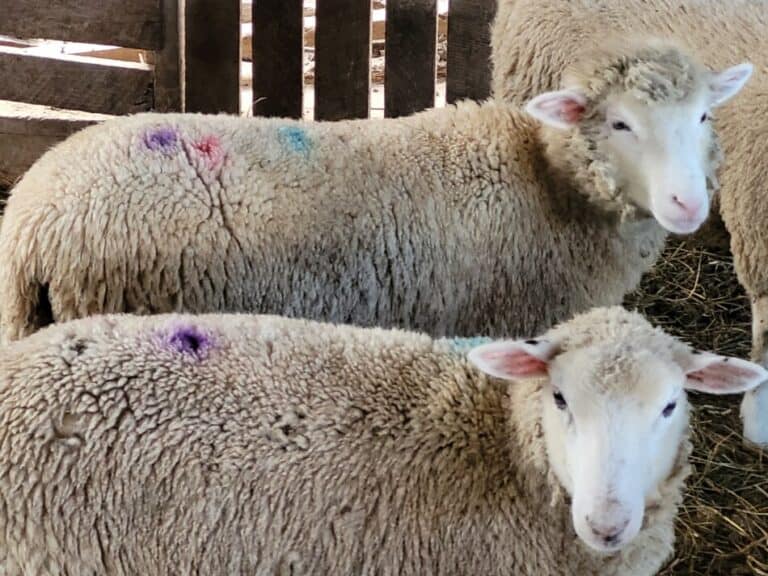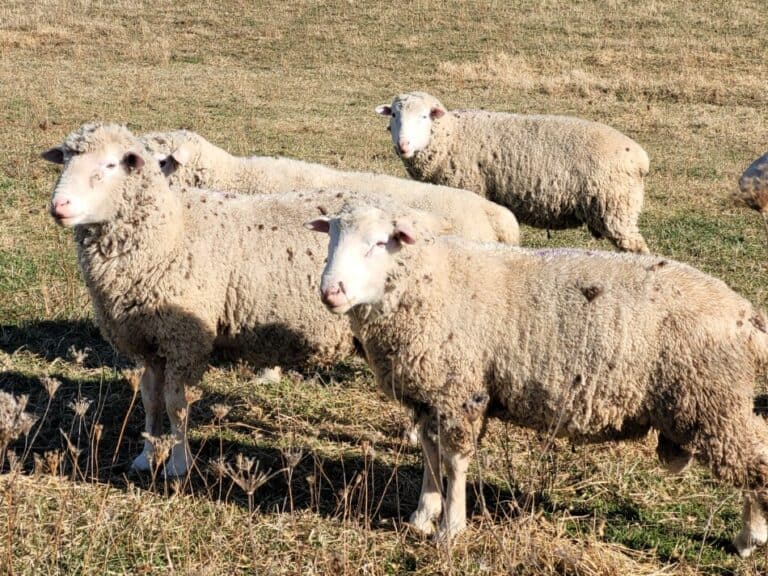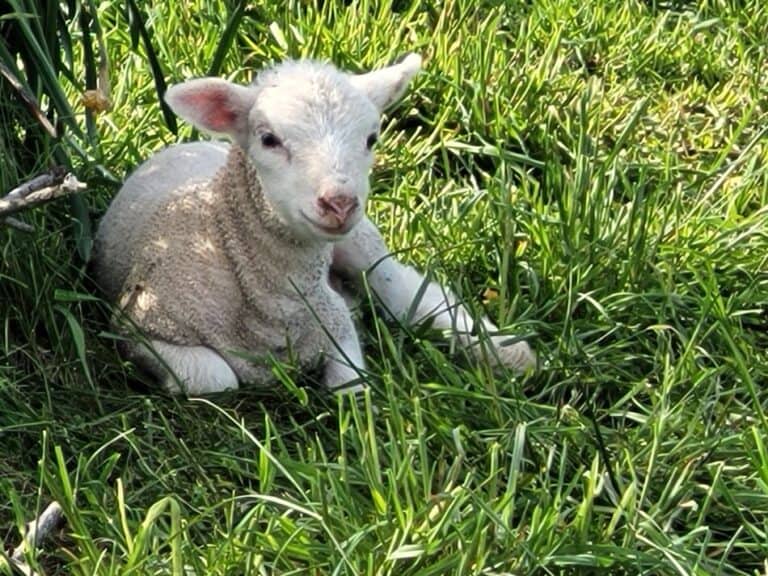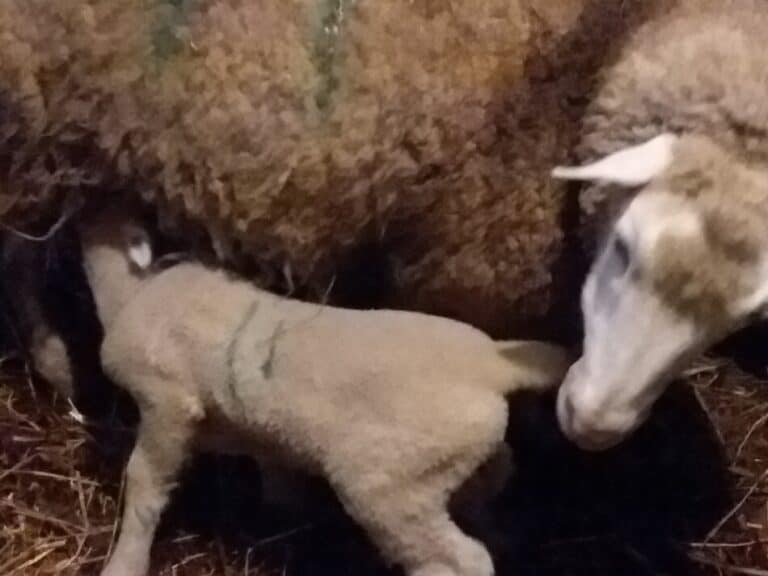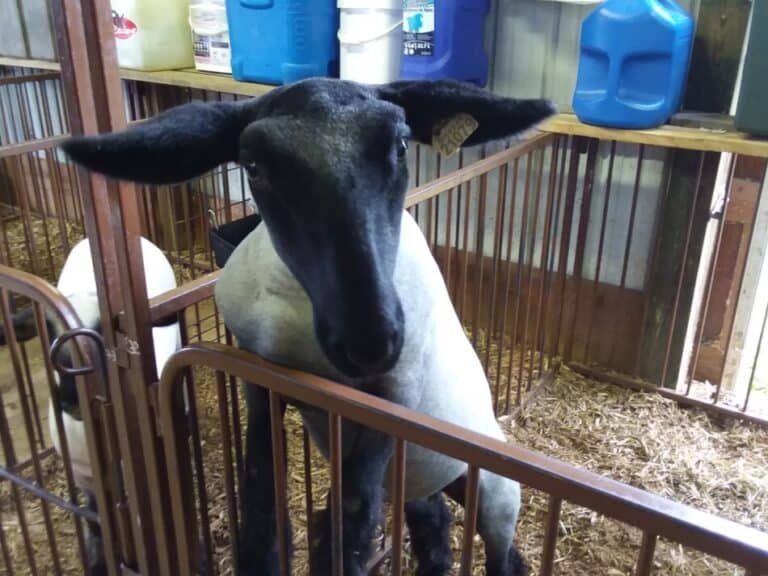Is Keeping Sheep Easy? Answers From A Full Time Shepherd
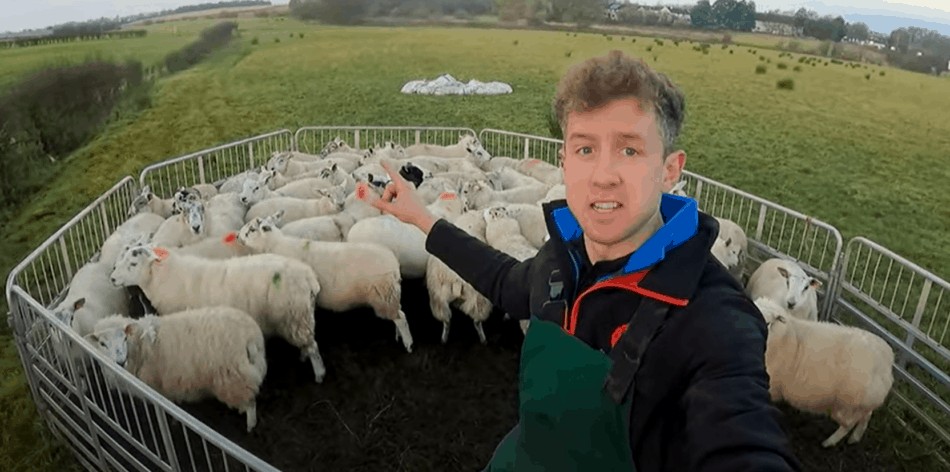
When you are thinking about getting started with sheep, you’ll want to know what you will need to do with your flock? How much time and effort will your flock need, in other words, is keeping sheep easy on flock owner?
With good management and sheep suited for your area, keeping sheep is fairly easy. There are a few management activities that are hands on, but overall, sheep require the same daily care as most other livestock.
My husband and I are full time shepherds of our own commercial flock. We raise sheep our on a grass based farm in Ohio. Our daily sheep management is moving fence and observing the flock, not too bad of a way to make a living!
How To Find The Right Sheep Breed For You is an article I wrote geared towards anyone thinking of getting started with sheep, but not set on a specific breed yet.
Sheep thrive on grass
If you have plenty of grass available, sheep are likely to work well for your farm.
Sheep are made to eat grass, having a flock of sheep when you have pasture is a natural fit. If you have plenty of grass, (not brushy overgrowth) to be eaten, sheep are likely to be a great option for your farm.
Anytime your abundant resource, in this case the grass, is matched up with the thing your animals need, those animals are great candidates for being easy to raise livestock on your farm. Sheep and grass are perfect together.
For our flock, we keep them on grass year round. From mid April to mid November, assuming the weather cooperates, we feed no hay to the ewes, they just get grass and do well on it.
Backyard Sheep gives you some ideas about raising sheep when you have limited acreage.
Sheep are smaller bodied livestock
Since sheep are smaller bodied animals, any time you work with them it is easier on you than working with larger animals, like cattle. Catch pens are easier to build and actual handling of the animal is easier on you!
Sheep are easier to physically handle than larger animals
We don’t really have to catch our sheep all that often, but we do need to get ahold of them every once in a while.
If we can get close, we can grab the sheep in the field, to trim hooves or something similar, or set up a temporary catch pen out of netting and grab her without running the whole flock to the barn, all because the sheep are small.
Sheep working facilities can be lighter duty
Sheep are also easier to set up handling facilities for. Sheep can be effectively handled with panels, not so with larger or pushier animals.
Sheep can be contained and worked with using a simple set up that would not be suitable for pigs, as an example.
With sheep being a smaller bodied animal they are also shorter, so less extensive buildings and pens are needed for care and management of the flock.
Even though our flock is outside all year, we still need to have a working facility, which includes pens and a building.
Sheep are more helper friendly than larger livestock
Because of their smaller size, sheep are more of a family and helper friendly animal than some of the larger livestock.
Kids or people unfamiliar with animals can still be out with the flock helping us move fence or get the flock into the barn for deworming without worry that the sheep will push them around.
This goes for smaller bodied or older adults as well, you don’t have to be an all star athlete to help with sheep management activities.
It’s possible for sheep to be pushy, of course, especially where rams or new moms are concerned, but usually not a problem.
A flock of sheep likes to be left alone
Your flock likes to be left alone, comfortably grazing and hanging out with their lambs. They don’t need you in there messing, most days sheep just want to do their thing while you do yours.
After your daily feeding, which includes time observing the flock, of course, your sheep are happy to be left alone until the evening check.
This is the beauty of setting up your sheep management to head off any potential problems early on. In the normal course of things, you just make sure the sheep are okay. Them needing you for more than food is unusual.
Of course, there are exceptions, like during lambing, but overall, sheep are okay keeping themselves busy grazing and then relaxing while chewing her cud.
So what does this mean for the shepherd? It means that our job is to keep the sheep happy and healthy, by setting up a management system in which most days the sheep do things they like to do.
Remember, we still observe the sheep at least once a day in the winter and a few times a day in the summer, since they have lambs. Daily work with the sheep is hands off the animals. We just move fence and let them eat.
Shearing, deworming, hoof trimming are active days for the shepherd
There are a few management activities that require setting up and physically handling the sheep.
These are not things you’ll be doing everyday, but are activities that would be done on a regular schedule, determined by the needs of your flock.
A short list of these intensive but occasional sheep management activities are:
- deworming
- lambing
- shearing
- hoof trimming
- vaccinations
Not all flocks need all of these things done, but all flocks will have a flock specific combination of management activities needed for having happy and healthy sheep.
Which ones you do and how you do them depends upon the needs of your sheep and how you have decided to manage the flock.
For instance, we have found that we do not need to vaccinate our sheep. Many shepherds in the area do and we used to, as well, but now we do not.
On the flip side, we deworm. Some shepherds in our area feel their flocks do not need dewormer or they have genetics that can perform without deworming, we do not. We are working on it, but we’re not there yet!
Every shepherd has to determine the best timing for management activities for his or her flock. When you are new, use the schedule that the shepherd you purchased your sheep from uses. This will keep your job simple.
To give you an idea of things to consider for your flock, read Sheep Production and Management by New Mexico State University. This PDF gives a nice overview of operation wide sheep management needs.
Without proper management, sheep can be frustrating
Not all people share the opinion that raising sheep is a good or profitable way to spend your time. Usually this is from not keeping up with the management of the flock or buying junky sheep to begin with.
Sheep are sensitive to stress and need to be observed daily by the shepherd to make sure the flock is happy and healthy. This will help you catch any problems early, when they are easiest to fix.
All shepherds have problems or challenges come up with their flock. Great shepherds know or learn how to handle things early, poor shepherds ignore problems and and up with poorly performing flocks.
If you let the problems, whatever they are, get out of control, now keeping sheep will be difficult for you, not to mention hard on your sheep.
The same sheep with good management, will do well. It’s generally the person that is messing something up or slacking on their end of the deal, not the sheep.
It is possible that you bought poor genetics to begin with, if that’s the case, then, sadly, the problem is the person here too. Buying poor quality sheep is a fast track to frustration.
You must start with good stock and put time into observing your flock to be successful with sheep.
Is keeping sheep easy? Most days, yes, because we have set up a plan to give the sheep what they need including daily observation time to make sure the plan is working and is adjusted quickly when needed.
Image credit: image at beginning of the article is from The Sheep Game (YouTube), Cameron Wilson, owner, with lambs in the catch pen
